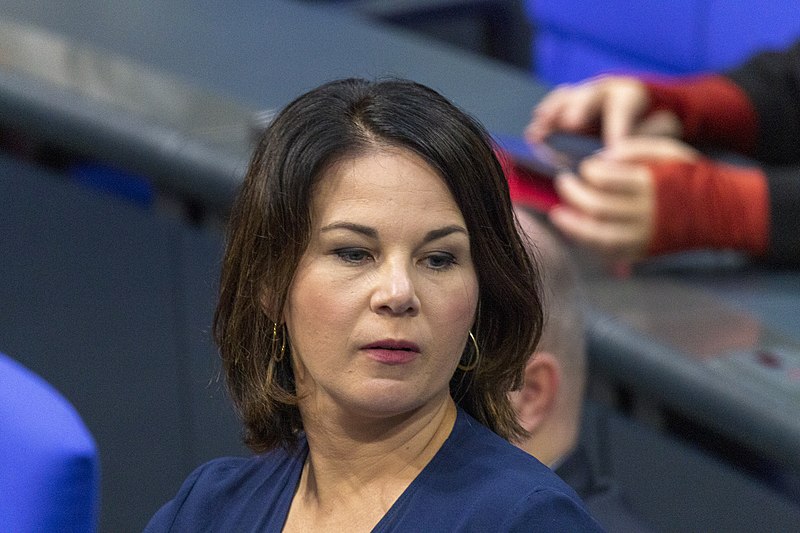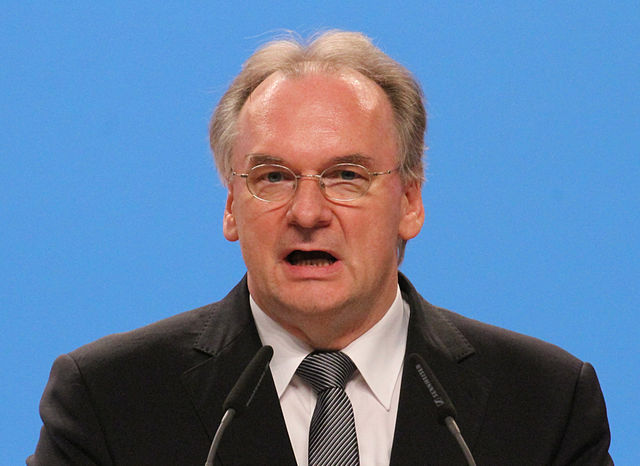A week ago Saxony-Anhalt voted! The media prediction – a neck-and-neck race – was cock-eyed! But outside Sachsen-Anhalt (in German), did anyone really give a damn? Yes, some did!
It is sandwiched along the Elbe River between “genuine” Saxony to the southeast, with Dresden and Leipzig, and Lower Saxony (Niedersachsen) to the west, which has Volkswagen. And what has it got?
Tons of history, mostly German. Bach spent his happiest years in little Köthen, whose music-loving ruler-prince played in his ensemble. But Bach left the Anhalt town and moved on to Leipzig. George Frederick Handel, born and raised in Halle (Anhalt), also moved on, to Hamburg, Rome, London (and “The Messiah”). Martin Luther was more faithful; he nailed his 95 Theses on a church door in Wittenberg (Anhalt), and was both born and died in the region. That at least is worth noticing!
The state capital, Magdeburg, can claim a little fame as birthplace of Friedrich Wilhelm Gerhard Augustin von Steuben, or “Baron Steuben” – the fantastic phony! A lowly captain when kicked out of the Prussian army (maybe for being gay), he was broke, his “baron” title and noble “von” were invented, his fancy general’s uniform was a creation of Ben Franklin’s Paris tailor. But it all worked, George Washington was glad to have one of Frederick the Great’s officers build up a disciplined army at Valley Forge and help win the Revolution. And Magdeburg boasts a fine statue of Steuben.
As old as Charlemagne, its founder, it is proud of another man, who was mayor but loved to try his hand at other pursuits (quite different from those of New York’s governor). In 1654 he pumped all the air out of two large copper hemispheres, fit together to prove the strength of atmospheric pressure. It proved so powerful that two teams of horses could not defy the vacuum and pull the two apart. Once air was allowed back in they fell apart immediately.
CDU Win Election Easily
Two strong sides were in play again last Sunday. No matter how the other political horses strained, they could not break the double-bind of the two, invulnerable despite their differences. Six parties were in the running, there was hot air in abundance, but those two kept their tight grip.
Unlike 1654, both good and bad news was involved. It was good for Saxony-Anhalt’s premier for ten years, Reiner Haseloff, 67, a serious-looking senior, whose down-to-earth manner resembled that of another East German from the same “Christian” party, Angela Merkel. As with father or mother figures in other states, his personal popularity helped win him a third straight victory.
But the 37% tally for his CDU, a fat 7.3% increase over its result five years ago and amazingly high with six parties in the race, was based on more than fatherliness. Repeated predictions that the rabid, almost openly fascist Alternative for Germany (AfD) might win out were simply too frightening for many East Germans. And though Haseloff is as conservative as other Christian Democratic (CDU) leaders, he has steadfastly rejected all attempts inside his party to cuddle up to AfD leaders and consider an agreement or coalition with them. A widespread fear of the far right was decisive.
This victory, even in a lesser East German state, was what you might call (if it were not for Covid sensibilities about tender spots) a “shot in the arm” for the “Christian” CDU, which had grown shaky on the national level. The sigh of relief from Armin Laschet, its less than charismatic chancellor candidate for September 26th, was almost visible…”We won! Hurrah for Saxony-Anhalt!”
AfD Stumbles – but Still Gets Over 20%
And the other good news? The AfD came in 16 points behind the CDU and 3.5% lower than its result five years ago. Despite its boasting predictions and the media warnings, there was no neck-and-neck dash against Haseloff and no cuddly necking with right-wingers in Haseloff’s party. Not now, anyway.
But that’s where the good news sours into bad news.
True, the AfD lost ground with its 20.9% – in national polls it is just half that. It has nothing like the support in the U.S.A. for an increasingly extremist GOP, nor does the AfD possess such a fearsomely unifying Führer figure. But it remains alarming enough; in much of Eastern Germany it is in second place, as in Saxony-Anhalt. Many pundits blame oldsters, “their thinking still twisted by GDR totalitarianism.” This is nonsense; the far right is not strongest with them but with disoriented, often hopeless young males who experienced the GDR only as babies and toddlers, if at all.
Just add them up; the AfD, whose domestic policy hardly conceals its fascist ideas, plus Haseloff’s winning CDU, always on the right of the spectrum, plus the Free Democrats, bare-faced pro-capitalist, who won enough votes (6.4%) to return to the legislature in Saxony-Anhalt. The sum of 64.3% means that nearly two-thirds voted “right-handed”. Is that an omen for the September elections? The three horses pulling against them have proved very lame.
The Left Does Badly
The Social Democrats (SPD) claim to be defenders of working people and world peace were hobbled long ago when they became junior partners of their traditional CDU rivals, both in Saxony-Anhalt and on the national level. They paid dearly for this, getting a pitiful 8.3% on Sunday, so low it caused tears, almost sobs, during post-election TV interviews with their candidates.
The Greens, hoping to break through in the East at last, got 6.1, a tiny 0.7% over 2017. And sad faces!
But faring worst of all was the LINKE! Once proud in the saddle, with hopes of victory in a state with long working-class traditions, they lost over 5% of their supporters in five years and dropped to 11.2%! The fact that most of those they lost switched to the Christians just to keep the fascists out was no consolation. Those voters were lost! The LINKE election slogan, simply “Better – Die Linke!” had been no great inspiration.
General Election News
Can these three parties do any better on the national level where the Social Democrats are down to 15%, pitiful enough for a party whose leader, Willy Brandt, once ruled the roost. Their current chancellor candidate, Olaf Scholz, 62, now Vice-Chancellor and Finance Minister, puts up a brave front but is facing two smelly scandals. A big financial services provider, Wirecard, high in the German charts, with ties to countless enterprises, proved phonier than “Baron von Steuben”! A London journalist let some air in; its debts were huge, its assets at the vacuum level of Magdeburg’s hemispheres. Some board members got arrested but the biggest fish disappeared. So did 1.9 billion euros. The Scholz office, the main watchdog to prevent such shenanigans, was somehow dozing.
Scholz seems to have memory problems as well. When the super-wealthy Warburg bank got caught defrauding the government in a billion-level tax rip-off, it called for help from the mayor of Hamburg, site of its main office. The mayor denied any connection – until the banker testified in court. Then he had to admit, looking very innocent, that if there was indeed such a call he had “no concrete memory of the content” and had never “exercised any influence in the tax matter.” But after more beans were spilled he finally recalled: yes, he had indeed met three times with the banker and given him tips per telephone. In the end the debt to the taxpayers went unpaid, Warburg remained unscathed. And Olaf Scholz, then Hamburg’s mayor, is now the Social Democratic candidate for the job of chancellor.
Who else wants the job? A major contender is the candidate of the “ecology” party, the Greens. Annalena Baerbock, young -looking at 40, vivacious, still displaying, like her party, a whiff of its left-leaning, untraditional, feminist past, in contrast with elderly establishment gentlemen. The Greens had soared amazingly in national polls, even overtaking the Christians on some days. Baerbock was given a fighting chance to replace the retiring Angela Merkel, that other daughter of East Germany.
Then her opponents found flies in the ointment. Stupid remarks by a few misogynists hardly registered, but even small blots in the squeaky-clean background expected of a Green candidate hit hard. Her official vita included more credits, academic and organizational, than fitted the facts. “In my brief, compressed resumé I unintentionally offered impressions I had not wished to create. That was crappy.“ In her income report to the Bundestag she had neglected to mention 25,000 euros paid her by her own party. “There should have been a more careful checkup… we have learned a lesson,” she noted ruefully. Minor matters, but they weakened her odds, already hit by the poor showing in Saxony-Anhalt. But more crucial matters intruded.
Cold War Campaigning
For reasons possibly affected by big, lucrative trade deals, some German leaders have not joined so fervently in the growing denunciations aimed belligerently at Russia and China. At times even Merkel dared to defy the commanding voices from the Pentagon, NATO-HQ in Brussels and all the media marionettes.
Now the CDU candidate Armin Laschet has dared to call “demonizing Vladimir Putin not a political policy but rather an alibi for the absence of one”. He criticized “marketable anti-Putin populism” and, while disapproving Russian policies, said it was necessary to “imagine oneself in the thinking of one’s conversation partner if one wishes to engage in foreign policy relations.”
Even Foreign Minister Heiko Maas, never a leftist peace activist, opposed attacks, verbal or otherwise, against Russia: “We can have no interest in joining in this confrontation. We want dialogue and good neighborliness with Russia,” he said and warned against “the many smart Alecs who always demand tougher and tougher measures.“
Such unusual remarks were balanced enough to anger, even enrage the bellicose elements known as the “Atlanticists”. And among the angriest “smart Alecs” were leaders of the Greens like Annalena Baerbock. Aside from ecology demands such as higher gas prices and lower speed limits, which angered those forced to drive to work, and tainted by agreements with big business, who should not be “too heavily over-taxed”, a main line of Greens like Baerbock has long been that “a tougher German stance toward Russia and China … should be a priority.” While demanding an “increase in pressure on Russia” to counteract tanks it deployed on its own territory, she finds nary a word about NATO maneuvers along Russian coasts and frontiers far distant from German or American borders.
Is one CDU-Christian wing, feeling pressure from the voters, doing some re-thinking and leaning further toward detente while the other goes all-out to build up and train aggressive modern military forces? The question also goes to the SPD, with some realistic voices now audible. Even in the Greens, pressure from their “old guard” is pushing against modern killers like armed drones. At their latest conference the pro-drone leadership won – but only by a very slim margin of 347 to 343 delegates. At times it almost seems like a subtle tug of war.
Die LINKE is Losing Ground
But what about the LINKE (Left)? Despite arguments within its ranks about Putin, about using the Bundeswehr abroad, on allying with the SPD or Greens or rejecting any such ties (now out of reach anyway), its anti-war stand was never influenced by pressures from auto-makers, agricultural monopolies, banks or greedy investors, and most certainly not from armament giants like Krupp or Rheinmetall. Unlike the others, it gets not a cent from any of them. All its policies, even those debated among its members, were related to the interests of working people, children, pensioners, and to opposing every activity by neo-Nazis. Sometimes Greens, Social Democrats, even CDUers joined in. But the LINKE were certainly the most consistent .
With post-Corona threats to peace internationally and to freedom domestically demanding militant fights on many issues, their voices, votes and actions will be urgently needed. But despite very promising signs at their February congress they have largely failed to meet the challenge.
Some members are indeed waging a courageous battle against soaring rents in the city-state of Berlin, working to collect 225,000 signatures (175,000 approved ones) for a “confiscation” referendum which is truly scaring the rent-scrouging fat cats. But on the national political scene they have largely disappeared. A hostile media plays its part. But the LINKE have consumed themselves in inner controversy: disputes about imaginary future coalitions, refugees and immigration, about a loss of contact with working people as opposed to higher-educated minorities. Most recently about “identity groups” and friction with two of its best-known party personalities and most forceful orators, Sahra Wagenknecht and her husband Oskar LaFontaine. Are they to blame for splitting and weakening the party? Or are they still a force for militancy? Would Sahra win or lose votes in her state of North-Rhine-Westphalia. Should she be expelled because of damaging criticism? These questions have distracted far too many in the party from all the fights which need to be fought.
Such quarrels have already gained life and death proportions! The LINKE has not only lost calamitously in Saxony-Anhalt, in the national polls it has dropped from a year-long position of about 9-11% down to its current 6-7% level. If it drops further, below the 5% needed to maintain its presence in the Bundestag, it will have basically carved itself into political impotence! I hope my next Berlin Bulletin can report a change for the better! It is so necessary!
++++++++++++++
Remembering Joseph Almudéver
Here’s a note on a very different – sad but more natural loss!
On May 23 old Joseph Almudéver, 101 years old, passed away, ending one of the most heroic, dramatic and tragic episodes in all history. He was the last survivor of the International Brigades, which included about 40,000 brave, devoted men and women from some fifty countries who fought fascism in Spain. They fought a vain battle to stop Hitler, Mussolini and their vassal Francisco Franco from destroying a democratic, progressive republic and testing weapons and tactics for the World War they were preparing for.
Five years ago I was privileged to get to know Joseph, a jolly old fellow, friendly, alert and clear, when our various “remembrance ”groups toured sites of the Brigade story. He stressed to the end that the war was not a civil war but an international conflict, in which Spain was defeated because of the betrayal by governments, especially those of Britain, France and even the USA. Roosevelt, despite his sympathies, bowed to the pressures of the racist south and the pro-fascist cardinals and archbishops of the Catholic Church and let American corporations ship trucks and fuel – only to the fascists. The only two countries which came to the aid of Spain, saving Madrid in 1936 and enabling it to hold out for two and a half brutal years, were distant Mexico and the Soviet Union.
To the end of his days, Joseph remained a convinced Communist. He is survived by his older brother, now 103, who also fought for the Republic but not in the International Brigades (which included many Spanish soldiers like Joseph). That great tradition embodied by the two brothers – internationalism, battling fascism, personal commitment – remains as relevant and urgently necessary today as ever. It was his message!




